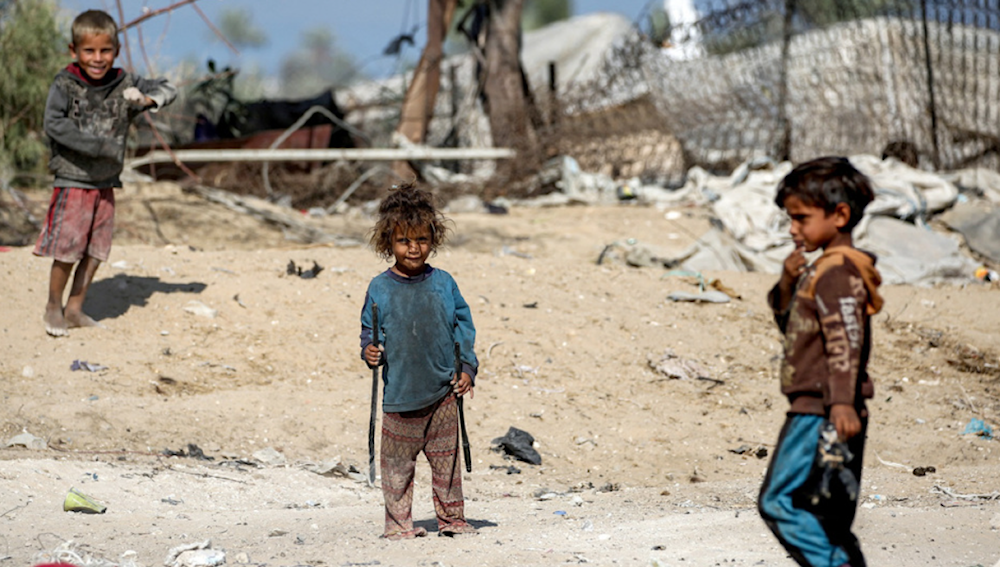'Israel' targeted children in Gaza during polio campaign: WHO
Currently, 15 UN and humanitarian organizations have described the situation in northern Gaza as "apocalyptic".
-

Children play together in the dust near shacks in Khan Younis in the southern Gaza Strip on October 30, 2024. (AFP)
Israeli occupation forces targeted a clinic during a polio vaccination program in the Gaza Strip, wounding numerous Palestinian children.
The World Health Organization (WHO) said that six people, including four children, were injured in a Saturday strike on the Sheikh Radwan facility.
A humanitarian pause had been in place at the clinic to allow for the second and last round of poliovirus vaccines, according to WHO Director-General Tedros Adhanom Ghebreyesus.
Ghebreyesus expressed on X that the report is "extremely concerning", citing that a WHO team was present shortly before the strike took place.
“This attack, during a humanitarian pause, jeopardizes the sanctity of health protection for children and may deter parents from bringing their children for vaccination,” he stated, emphasizing the importance of not targeting areas.
"These vital humanitarian-area-specific pauses must be absolutely respected. Ceasefire!"
We have received an extremely concerning report that the Sheikh Radwan primary health care centre in northern #Gaza was struck today while parents were bringing their children to the life-saving #polio vaccination in an area where a humanitarian pause was agreed to allow… pic.twitter.com/YaFL6pQT3c
— Tedros Adhanom Ghebreyesus (@DrTedros) November 2, 2024
UNICEF also criticized the attack on the facility involved in the polio vaccine rollout, emphasizing that "robust micro plans" were created to adapt to population shifts and displacements. The second phase of vaccinations began on Saturday after delays due to intense Israeli shelling and access issues.
The campaign was initiated following the first polio case in 25 years, which paralyzed a newborn boy in August. In a separate incident, UNICEF chief Catherine Russell reported that a staff worker's car was fired upon by a suspected quadcopter, though the driver was unharmed.
Currently, 15 UN and humanitarian organizations have described the situation in northern Gaza as "apocalyptic", with approximately 15,000 children under ten still inaccessible to the immunization program. The WHO aims to administer a second dose of the oral polio vaccine to 119,000 children in the area.
The WHO has said that the recent humanitarian pause in Gaza has been drastically reduced, now restricted to only Gaza City, affecting the polio vaccination program. Experts warn that delays in providing the second dosage might imperil attempts to halt the illness, which requires at least 90% of youngsters to receive two treatments to effectively prevent transmission.
Despite the Israeli siege of northern Gaza, the Polio Technical Committee, which includes the Palestinian Ministry of Health, WHO, UNICEF, and UNRWA, has agreed to restart polio vaccination campaigns for children. The campaign's final round was postponed owing to continuous Israeli airstrikes and ground confrontations.
Roughly 216 teams will provide immunizations at 106 fixed sites, with 22 additional locations added for displaced populations. Furthermore, 209 community mobilizers will seek to create awareness about immunization campaigns. However, UN agencies have emphasized that access to all children in northern Gaza who require the last vaccination shot will remain limited.
According to the agencies, "The final phase of the campaign had aimed to reach an estimated 119,000 children under 10 years old in northern Gaza with a second dose of novel oral polio vaccine type 2 (nOPV2) however, achieving this target is now unlikely due to access constraints."
To stop poliovirus transmission, at least 90% of all children in every village and neighborhood must be immunized, which will be difficult to achieve given the circumstances, according to the authorities.
According to the UN health agency, delaying the administration of a second dosage of nOPV2 for six weeks lowers the impact of two closely spaced rounds, lowering immunity.
The WHO has also warned that having a substantial percentage of youngsters skip their second vaccination dosage gravely jeopardizes attempts to limit the transmission of the virus.

 4 Min Read
4 Min Read








